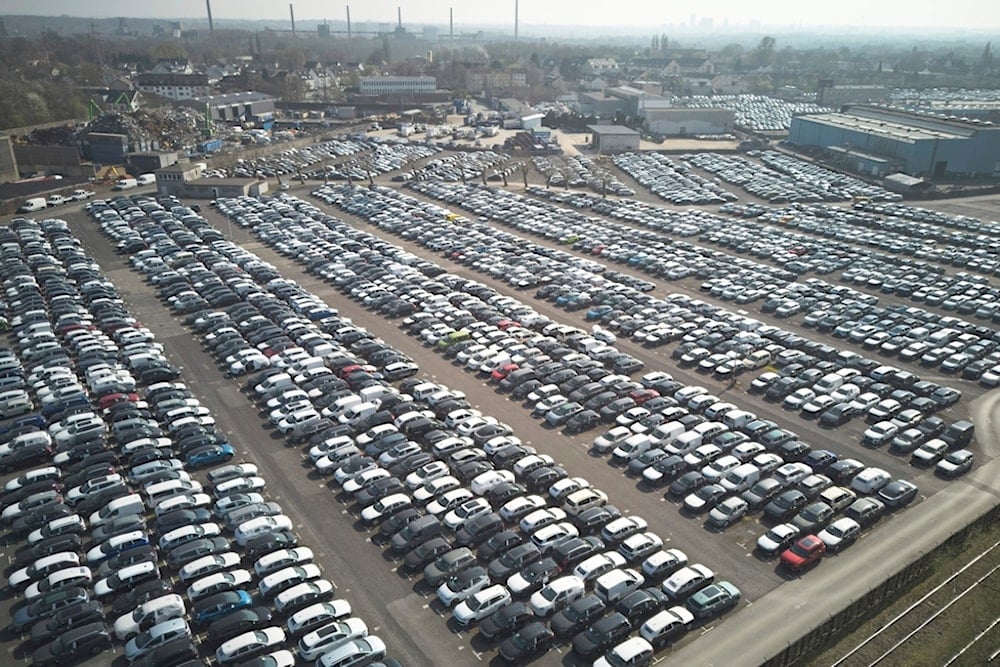Germany loses 245,000 industry jobs as exports to US, China sink
Germany's industrial crisis deepens with 245,000 jobs lost, exports to the US and China collapsing, recession confirmed, and Chancellor Merz urging new trade partners beyond Washington.
-

New German cars are stored at a logistic center in Essen, Germany, Thursday, March 27, 2025. (AP Photo/Martin Meissner)
Germany's industrial sector is sinking deeper into crisis, with fresh data showing mounting job losses, shrinking revenues, and collapsing exports under the weight of US tariffs and years of structural weakness.
A new study by consulting firm EY revealed that nearly a quarter of a million industrial jobs have vanished since 2019, with employment falling by 2.1% in the second quarter of 2025 alone, leaving the workforce at 5.43 million.
In total, about 245,500 jobs have been lost in six years. Industrial revenues reached more than 533 billion euros ($624 billion) in the quarter but still registered a 2.1% decline from last year, extending a downturn that began in early 2025.
The car industry remains the epicenter of the slump. Employment in automotive manufacturing dropped 6.7% in Q2, equivalent to 51,500 jobs lost in a single year.
German giants like Volkswagen, Mercedes, and supplier Continental are cutting back as they struggle with Asian competition, the high costs of shifting to electric vehicles, and steep US import tariffs.
Exports in freefall
Exports, the backbone of German industry, are deteriorating rapidly. Sales to the United States fell 10% in Q2, while shipments to China dropped 14%, reflecting both tariff pressures and weaker demand.
This follows news from the federal statistics office Destatis that overall GDP contracted by 0.3% in the same quarter, pushing Germany officially back into recession.
Economists warn that the tariff shock is only accelerating a longer trend of stagnation. German output has been flat for five years, with GDP still about 5% below its pre-pandemic trajectory, translating into a loss of roughly €2,500 per household.
Industrial production has fallen 12% since 2018, and June's output marked the lowest level since the Covid-19 pandemic.
High energy prices after the cutoff of Russian gas, combined with Berlin's restrictive fiscal "debt brake," have further limited recovery efforts.
ING chief economist Carsten Brzeski told AFP that earlier signs of optimism in mid-2025 were misleading, driven by "temporary front-loading as US customers rushed to get orders in before new tariffs took effect."
Read more: Germany cuts GDP forecast to zero, citing Trump tariffs
Political divisions
The economic pain is fueling disputes within Germany's coalition government. Finance Minister Lars Klingbeil has floated tax increases to plug a projected €30 billion budget shortfall, but Chancellor Friedrich Merz’s CDU and Economy Minister Katherina Reiche insist that lowering the corporate tax burden is essential to restore competitiveness.
As the crisis deepens, Chancellor Merz has signaled that Germany cannot rely solely on its transatlantic relationship. At a government Open Day in Berlin, he said Germany should pursue "partners in the world that share our thinking” and “consistently go down that road."
While acknowledging that ties with Washington remain critical, Merz pointed to South America, Asia, and Africa as potential alternative markets.
His remarks indicate growing pressure on Berlin to diversify trade relationships as US tariffs and sluggish global demand expose the fragility of Europe’s largest economy.

 3 Min Read
3 Min Read










